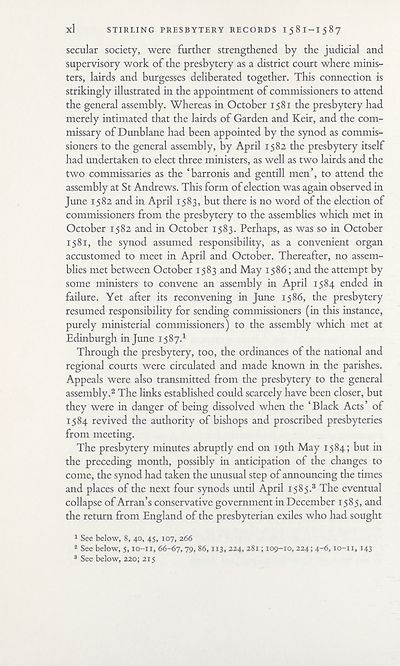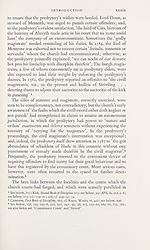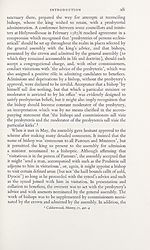Series 4 > Stirling Presbytery Records 1581-1587
(45) Page xl
Download files
Complete book:
Individual page:
Thumbnail gallery: Grid view | List view

xl STIRLING PRESBYTERY RECORDS I581-I587
secular society, were further strengthened by the judicial and
supervisory work of the presbytery as a district court where minis¬
ters, lairds and burgesses deliberated together. This connection is
strikingly illustrated in the appointment of commissioners to attend
the general assembly. Whereas in October 1581 the presbytery had
merely intimated that the lairds of Garden and Keir, and the com¬
missary of Dunblane had been appointed by the synod as commis¬
sioners to the general assembly, by April 1582 the presbytery itself
had undertaken to elect three ministers, as well as two lairds and the
two commissaries as the ‘barronis and gentill men’, to attend the
assembly at St Andrews. This form of election was again observed in
June 1582 and in April 1583, but there is no word of the election of
commissioners from the presbytery to the assemblies which met in
October 1582 and in October 1583. Perhaps, as was so in October
1581, the synod assumed responsibility, as a convenient organ
accustomed to meet in April and October. Thereafter, no assem¬
blies met between October 1583 and May 1586; and the attempt by
some ministers to convene an assembly in April 1584 ended in
failure. Yet after its reconvening in June 1586, the presbytery
resumed responsibility for sending commissioners (in this instance,
purely ministerial commissioners) to the assembly which met at
Edinburgh in June 1587.1
Through the presbytery, too, the ordinances of the national and
regional courts were circulated and made known in the parishes.
Appeals were also transmitted from the presbytery to the general
assembly.2 The links established could scarcely have been closer, but
they were in danger of being dissolved when the ‘Black Acts’ of
1584 revived the authority of bishops and proscribed presbyteries
from meeting.
The presbytery minutes abruptly end on 19th May 1584; but in
the preceding month, possibly in anticipation of the changes to
come, the synod had taken the unusual step of announcing the times
and places of the next four synods until April 1585.3 The eventual
collapse of Arran’s conservative government in December 1585, and
the return from England of the presbyterian exiles who had sought
1 See below, 8, 40, 45, 107, 266
2 See below, 5,10-11, 66-67,79, 86,113, 224, 281; 109-10, 224; 4-6, io-ii, 143
3 See below, 220; 215
secular society, were further strengthened by the judicial and
supervisory work of the presbytery as a district court where minis¬
ters, lairds and burgesses deliberated together. This connection is
strikingly illustrated in the appointment of commissioners to attend
the general assembly. Whereas in October 1581 the presbytery had
merely intimated that the lairds of Garden and Keir, and the com¬
missary of Dunblane had been appointed by the synod as commis¬
sioners to the general assembly, by April 1582 the presbytery itself
had undertaken to elect three ministers, as well as two lairds and the
two commissaries as the ‘barronis and gentill men’, to attend the
assembly at St Andrews. This form of election was again observed in
June 1582 and in April 1583, but there is no word of the election of
commissioners from the presbytery to the assemblies which met in
October 1582 and in October 1583. Perhaps, as was so in October
1581, the synod assumed responsibility, as a convenient organ
accustomed to meet in April and October. Thereafter, no assem¬
blies met between October 1583 and May 1586; and the attempt by
some ministers to convene an assembly in April 1584 ended in
failure. Yet after its reconvening in June 1586, the presbytery
resumed responsibility for sending commissioners (in this instance,
purely ministerial commissioners) to the assembly which met at
Edinburgh in June 1587.1
Through the presbytery, too, the ordinances of the national and
regional courts were circulated and made known in the parishes.
Appeals were also transmitted from the presbytery to the general
assembly.2 The links established could scarcely have been closer, but
they were in danger of being dissolved when the ‘Black Acts’ of
1584 revived the authority of bishops and proscribed presbyteries
from meeting.
The presbytery minutes abruptly end on 19th May 1584; but in
the preceding month, possibly in anticipation of the changes to
come, the synod had taken the unusual step of announcing the times
and places of the next four synods until April 1585.3 The eventual
collapse of Arran’s conservative government in December 1585, and
the return from England of the presbyterian exiles who had sought
1 See below, 8, 40, 45, 107, 266
2 See below, 5,10-11, 66-67,79, 86,113, 224, 281; 109-10, 224; 4-6, io-ii, 143
3 See below, 220; 215
Set display mode to:
![]() Universal Viewer |
Universal Viewer | ![]() Mirador |
Large image | Transcription
Mirador |
Large image | Transcription
Images and transcriptions on this page, including medium image downloads, may be used under the Creative Commons Attribution 4.0 International Licence unless otherwise stated. ![]()
| Scottish History Society volumes > Series 4 > Stirling Presbytery Records 1581-1587 > (45) Page xl |
|---|
| Permanent URL | https://digital.nls.uk/126646695 |
|---|
| Description | Over 180 volumes, published by the Scottish History Society, containing original sources on Scotland's history and people. With a wide range of subjects, the books collectively cover all periods from the 12th to 20th centuries, and reflect changing trends in Scottish history. Sources are accompanied by scholarly interpretation, references and bibliographies. Volumes are usually published annually, and more digitised volumes will be added as they become available. |
|---|


